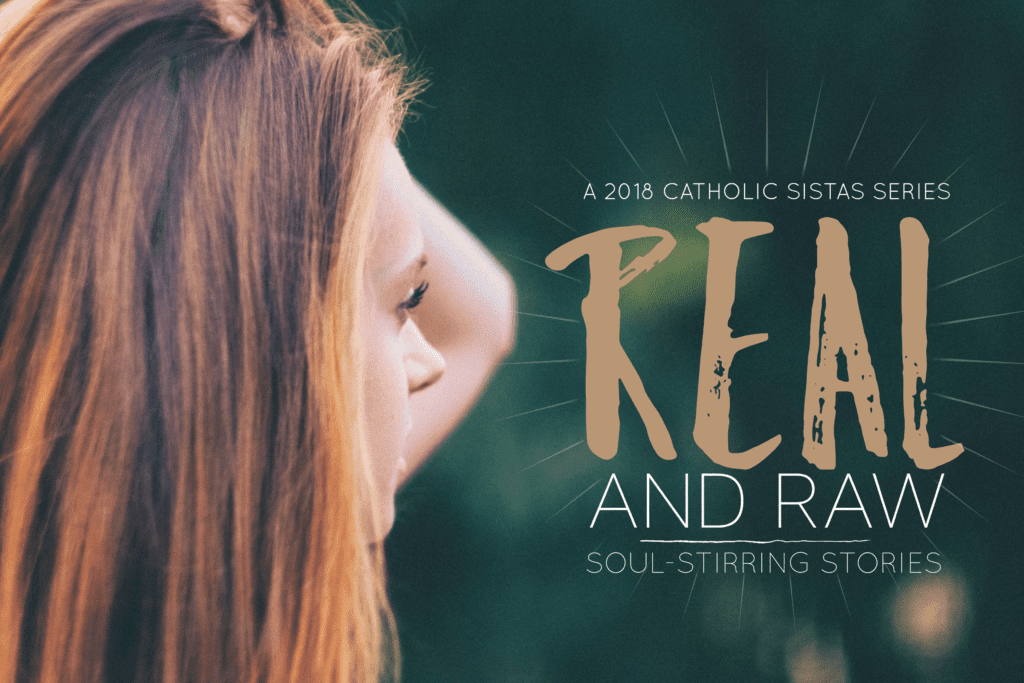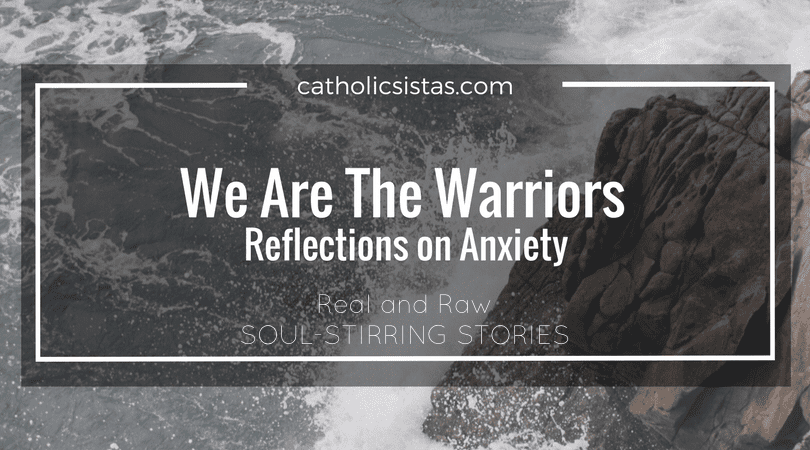
Welcome to this installment in the series Real and Raw – Soul-Stirring Stories, a series focused on taking a candid look at life’s struggles as we journey to heaven. Being Catholic doesn’t mean you won’t suffer–in fact, Jesus promises we’re likely to suffer even more for being His disciple. But Catholics often feel self-conscious about admitting to doubt, confusion, sorrow, or anger in their relationship with God. We want the world to be attracted to our beautiful faith, so we minimize the darkness and emphasize the light in our lives, usually at the expense of authenticity. Yet there’s value in sharing our journey in all its shades–in admitting there are gray and black days, too. We offer these stories to let our suffering readers know they’re not alone–we’re in the trenches with you and so is God, who loves us and has a divine purpose for pain, even if it’s hard to see or accept in the moment. Most importantly, we hope these stories give hope to readers…hope that there is help and that they will survive. And one day, they will make it out of the darkness and be stronger for it.
To start, thank you for letting me share these scattered thoughts with you. I’m no expert in anxiety; I’m just here to share my experience with this disorder. Hopefully, I can give some sense of support and truth to others who have experienced anxiety or who have a loved one who suffers from it. I know I have many beautiful sisters in Christ who have suffered from this more profoundly than I have and I am in awe of your strength.
Always.
When do I get anxious? Let me count the ways. I get anxious when:
- I’m two minutes late (the first minute is ok; two is too many).
- my shirt and my pants are slightly different shades of black (this one is hilarious, but try telling that to me in the moment!).
- I make dinner and it burns, it’s mushy, it has too much salt.
- I see a typo on an assignment I’ve created for my 5th graders–I know they won’t notice, but I DO.
- I say something awkward for the MILLIONTH time.
- my husband is gone for an extended period and I get lost in my head again.
- I try anything new (meal at a restaurant? new route home? new workout? Hello, anxiety.)
- it’s time to leave the house before a long trip (my husband has to drag me).
So, yes. I am almost always anxious.
The Frozen Mind
Most of the time, my anxiety is manageable and maybe even cute. It’s only slightly destructive, like the tiny jellyfish from Finding Nemo. A couple deep breaths and I’m good to go.
Then there are times I have full-on anxiety attacks. I freeze up, I can barely function. The best way I’ve found to explain those experiences is when you open up way too many browser windows on your computer and nothing will load. I’m juggling all of these worries, tasks, hopes, expectations, and I can’t make any of them happen, not a single one, so my brain gives up.
Best case scenario, I cease and desist. I crawl into bed and pull the covers over my head. I sleep 11 hours (which is still a miserable 6 am if you go to bed at 7 pm). Worst case…I don’t like thinking of the worst case. I’m yelling, crying, curling up on the tiles of the kitchen floor. I’m sending those horrible texts, saying those horrible things, ripping apart friends and family because I just can’t think.
And it sucks and I hate it and I’m fighting it.
Research Says
Like any good member of this generation, I have spent a lot of time googling anxiety, surfing chat boards, and Facebook groups, overwhelmed by the beautiful witness of so many people staying strong against the storm of worry and fear.
And there are so many of these stories. Anxiety is the most common mental disorder—more than depression, which was so surprising to me. It’s far more common than multiple personality disorder and schizophrenia, which get so much attention on crime shows.
And we beautiful sisters are twice as likely to struggle with anxiety disorders than men. We worry, tense up, and freeze. We imagine every possible negative outcome and these plow us down in a horrible avalanche.
We are the warriors against this anxiety.
Ugly Tears
I don’t believe anxiety is totally evil. True, I can see the devil trying to use my anxiety….telling me if I try a little harder, push myself farther, drain myself of more energy, work to finally be perfect, that I can finally be free of the anxiety.
And that lie almost works because, to be honest, I’m an extremely proud person. My confessions are often the same tape on repeat, centering on my need to be perfection itself, to act perfectly, speak perfectly, think perfect thoughts, even look perfect.
That’s where I see God using my anxiety. Anxiety is like a lightning bolt into my perfect little world. I’m imagining my pride as a little pretty pink Barbie dollhouse and my anxiety is like the toddler knocking it over and throwing the furniture around.
And it’s beautiful.
I can see God teaching me patience…with myself. He’s teaching me kindness…to myself. He’s teaching me how to laugh that ugly laugh of pure joy that I’ve kept locked up. And those ugly tears that definitely smear my poor attempt at contouring.
What’s more, there are things about anxiety I would never give up. Being concerned and conscientious are beautiful traits. They make us good friends, hard workers, women who come in with a plan and heck yeah, we’re going to get it done. They make us an empathetic smile, a listening ear, a shoulder to cry on. These are our great and beautiful strengths. And I don’t know if I would give up these gifts even to rid myself of the struggles.
REFLECT
Let’s dig deeper. Did this story resonate with you? If so, please continue on below and consider starting a journal to jot down your answers. PRINT these questions and print to start your own journal based on different posts.
- What was my spiritual life like before this experience?
- How did the experience negatively impact my relationship with God?
- How did the experience negatively impact my relationships with my spouse, my children, my coworkers, my relatives, my friends?
- Was there anything that helped to alleviate the suffering I was going through? (e.g., counsel from others, professional help, medication/supplements, devotions, lifestyle changes)
- How did this experience positively impact my relationships, either during or afterward?
- How did this experience positively impact my spiritual life, either during or afterward?
- If I could go back and change how I responded to this experience, what would I do differently?
- What would I say to someone else in this situation to give her hope?
RESOURCES & SPIRITUAL HEALING
DBSA {Depression, Bipolar Support Alliance}
NAMI {National Alliance of Mental Illness}
NATIONAL SUICIDE PREVENTION HOTLINE
MTHFR {genetic mutation associated with depression, bipolar, and schizophrenia}
NIMH {National Institute of Mental Health}

